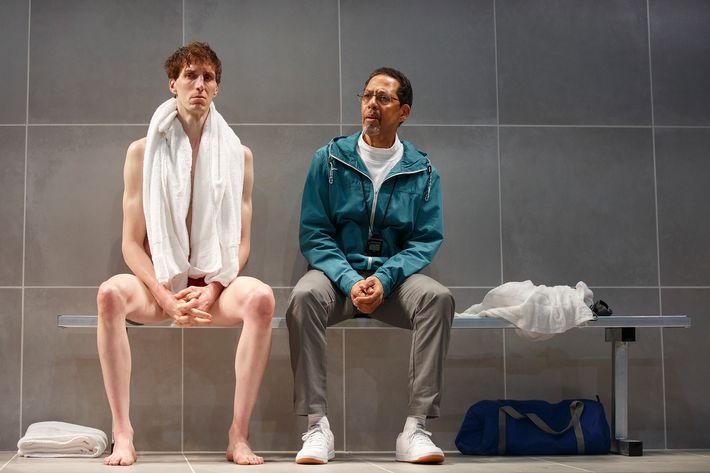
Danai Gurira’s devastating Eclipsed, about four women enslaved as “wives” to a rebel commander during the Liberian civil war, opens this Sunday on Broadway after a sold-out run at the Public Theater. Do not expect Gurira’s new play, Familiar, opening tonight at Playwrights Horizons, to follow a similar trajectory. For one thing, it’s a comedy, or really a sitcom, set among a family of Zimbabwean-Americans near Minneapolis, that holy-of-holies to lovers of the form. But the resemblance to The Mary Tyler Moore Show ends with the weather. Familiar tries so hard to domesticate its characters with the recognizable rhythms of punch-line dialogue, while at the same time addressing very large issues of assimilation and repatriation, that it winds up doing neither very well, even as it remains improbable throughout.
That the play is somewhat autobiographical — Gurira was born in Iowa and raised in Harare — may explain some of the tonal anomalies. The Chinyaramwira family is portrayed as if through a very pink lens. The loving, Type-A matriarch, a successful Zimbabwe-born doctor named Marvelous, so dominates her husband, Donald, and her American-born daughters, Tendi and Nyasha, and her sister, Margaret, and everyone else who comes near her, that she would almost certainly be unbearable if not leavened with TV-style humor:
Marvelous: You generation of today, it’s like, you get with this one and do it with him, it doesn’t work out, then you get with that one and do it with him, it doesn’t work out, and you are just going from person to person! Before you know it your genitals are like bus stops, one leaves, another arrives!
Margaret: [Laughing uproariously.] AHH HAHAHAHAHAHA!!!!!
Nyasha: MOM!
Marvelous allows no African cultural artifacts in her perfect Crate & Barrel living room, and insists that the family follow American football instead of soccer. But the conflict between her traditional values and her assimilated tastes is barely explored; it’s just name-checked. Though set up as the major character she is thus all but exiled from the actual plot, which involves Tendi’s wedding to Chris, a white man she met at a charismatic church that Marvelous derides as “happy clappy.” (“Why she didn’t stay at United Lutheran where she was raised I’ll never know.”) Chris, even more than Tendi, wants to honor her heritage, and has therefore convinced her to proceed with roora, a Zimbabwean bride-price ceremony in which the groom recompenses his in-laws-to-be for the loss of their gem. To lead this ceremony they have imported Marvelous’s older sister, Anne, from the old country. Anne serves approximately the same function here as a crazy sitcom aunt, arriving right before the commercial to clash with the décor and screw up everyone’s plans. You can almost hear the “Uh-oh!” on the laugh track, and Myra Lucretia Taylor, giving a huge comic performance in the role, laps it right up.
Though one welcomes the hijacking, it reveals another fault in the play. The roora rigmarole — interesting but in the end inconsequential — so overtakes the rest of the action that any claim it might have made to structural integrity is mooted. Gurira’s language, so fragrant and supple in Eclipsed, doesn’t help; it is stripped down to its bare function, as if written in haste from an outline:
Nyasha: So. How is work?
Marvelous: Great!! Our grant to research the function of DNA in determining inheritance at a molecular level came through, so we are busy.
By the middle of Act Two this absence of verbal color and character depth has left the play wandering around in search of a genre, landing now and then on romantic comedy, farce, and family-secret soap opera. (Someone’s background is not as expected.) Unfortunately, the staging by Rebecca Taichman — so masterful in other genre-crossing comedies, like Stage Kiss — is here unhelpful in focusing the action, or even the eye. At times, all eight characters are flung across Clint Ramos’s busy, wide stage like beads lost from their necklace, when this is the kind of material that needs a camera’s singular, coercive perspective. For all its worthy questions, its frequent big laughs, and a few good performances, this is a play that leaves you feeling, in more ways than one, unsure where to look.
* * *

An unsuccessful genre experiment like Familiar doesn’t detract from the exceptionally good season Playwrights Horizons has been having. Giving playwrights the next production they need is part of the mission (and part of the name). Lucas Hnath, whose play The Christians was one of the highlights of the company’s fall, is now getting his follow up as well, but at New York Theater Workshop, where Red Speedo opens tonight in a sensational staging by Lileana Blain-Cruz. I say sensational not only because the setting — an Olympic swimming practice facility — is represented onstage by an actual pool. (Well, part of one, but still: Congratulations to scenic designer Riccardo Hernandez.) Blain-Cruz’s work here is also a brilliant rendering of a difficult text, one that reads nearly like gibberish on the page but plays like a thriller onstage.
Thrillers are usually about some kind of theft, and that’s the case here, at least metaphorically. Ray, a highly promising but dimwitted swimmer, gets involved in a doping scandal that, from the sport’s perspective, could result in the fraudulent acquisition of medals. From Ray’s perspective, though, he is the victim: A scandal will jeopardize not only his place on the Olympic team but an endorsement deal with Speedo and his hope for a normal American life. To him, that means a life with money: He may look like a pickled Matthew McConaughey, with legs like paper towel tubes and a huge pneumatic chest, but he’s got enough sense to know that in this Trumpian winner-take-all world, he’s not even real if he isn’t a winner. How to get him out of trouble, and at what cost, is the subject of the play’s machinations, which also involve his snaky brother, his embittered ex-girlfriend, and his seemingly upright coach. They are beautifully played, at breakneck pace, by Lucas Caleb Rooney, Zoë Winters, and Peter Jay Fernandez.
But Hnath is never interested solely in the material repercussions of character. (The Christians was fundamentally about the paradox of evolving faith: If what you believe changes, how can you believe in belief?) In Red Speedo, the underlying subject seems to be the cost of morality, which is generally too high for people like Ray. When winning is all you’ve been trained for, and your body is your only asset, you have very few choices. This is not really an argument against poverty; besides, that’s pointless, because who would argue for it? But Hnath lightly suggests — he’s too subtle to use the big hammer — that the immoral imbalance of our current economy is stripping us down to our animal skins. All we’re good for is competition.
It could not have been easy to find an actor to play Ray. Alex Breaux — who was a charming lout as Brodie in the recent revival of The Real Thing — beautifully embodies not only Ray’s physicality but his pathos. (He wears the title garment throughout the play’s intermission-less 80 minutes.) When he tips his head to the side and conks the opposite ear, as swimmers do, the look on his face suggests he’s not just emptying his head of water but of actual thoughts. It takes some very smart acting to get that kind of unintelligence just right. Also some very smart playwriting. If Red Speedo is not, finally, as profound as The Christians — the pool is only four-foot deep — that’s doesn’t mean it’s unimportant. Shallows, too, are worth exploring.
Familiar is at Playwrights Horizons through March 27.
Red Speedo is at New York Theatre Workshop through March 27.

